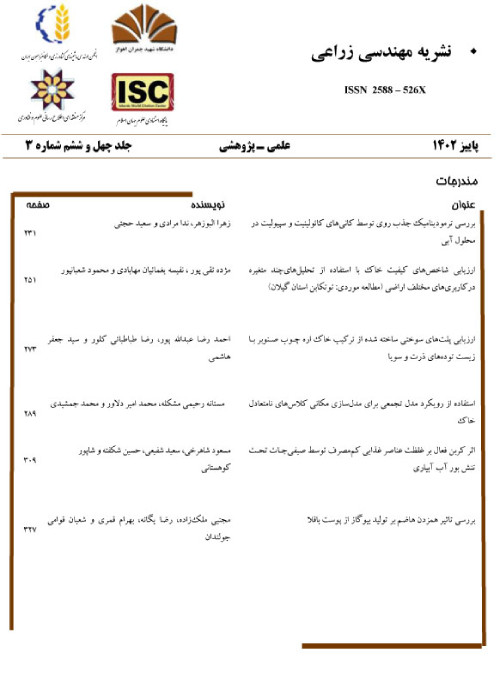Combined effect of salinity and Zn and Cu nutrition on some biochemical and physiological characteristics of rosemary (Rosmarinus officinalis L.) in a calcareous soil
Salinity is one of the common stresses in agricultural lands of arid and semi-arid regions in Iran. Furthermore, excessive CaCO3, high pH, nutritional disorders have been known as limited factors for plant growth and productivity in such soils. The cultivation of salt tolerant plants such as rosemary (Rosmarinus officinalis L.) is important from the point of view land reclamation. Rosemary is a woody plant, evergreen, perennial herb belonging to Lamiaceae family. It is native to Mediterranean but it can tolerate undesirable conditions such as drought and salinity stresses. Zinc (Zn) and copper (Cu) are essential micro-nutrients that play important roles in plant metabolic processes and can increase plant tolerance to salinity. Zn is vital for protein synthesis, protein stability, and different enzyme activities such as Zn/Cu superoxide dismutase and carbonic anhydrase. On the other hand, chlorophyll production, photosynthesis and enzyme activities are the most important role of Cu in plants. Superoxide dismutases (SOD) are metalloproteins that catalyze superoxide radicals (O2-) produced under salinity stress into oxygen molecules and hydrogen peroxide, resulting to increased tolerance of plants to salinity. The most abundant superoxide dismutase isozyme in plants is Cu / Zn SOD, in which the role of Zn is structural and copper plays a catalytic role.
There is limited information about the effect of micronutrient application on the growth and salinity tolerance of rosemary. This study was conducted to investigate the effect of Zn and Cu co-application on some physiological and biochemical characteristics of rosemary under saline condition. For this purpose, a completely randomized design was carried out in a factorial experiment. The factors consisted of four types of fertilizer treatments (T1: control, T2: control + zinc, T3: control + copper and T4: control + copper + zinc) and three levels of salinity stress (S0: 0, S1: 60 and S2: 120 mM as NaCl) in four replications in a calcareous soil under greenhouse conditions. After 90 days, the plants were harvested and some growth characteristics including shoot and root fresh and dry weight were measured. Some physiological and biochemical properties such as leaf relative water content (LRWC), membrane permeability (MP), malondialdehyde (MDA), shoot and root Na concentration, and shoot and root K concentration were also measured.
The results showed that salinity had no significant effect on fresh weight of shoots, while shoot dry weight of rosemary decreased as 60% in control treatment, 44% in zinc treatment, 38% in copper treatment and 27% in zinc + copper treatment. Leaf relative water contents of rosemary decreased in response to salinity stress, and the only co application of zinc and copper under 120 mM NaCl stress resulted to a significant increase of LRWC (9%). Salinity stress increased the membrane permeability of rosemary leaves. In contrast, at all salinity treatments, addition of Zn and Cu caused a significant decrease in membrane permeability of rosemary leaves. However, there was no significant difference between fertilizer treatments. Salinity stress induced a significant increase in the malondialdehyde content of rosemary. For example, MDA content increased by 39% in control and by 24% in Cu treated plants when salinity level reached from 0 to 120 mmol L-1. Based on the results, in soil treated with 60 mmol L-1, addition of Zn and Cu and at the higher salinity level (120 mmol L-1) addition of Zn to soils had a significant effect on leaf and root Na concentration and thereby improvement of plant salt tolerance. Also, the result showed that co-application of Zn and Cu could reduce the undesirable effect of salinity on shoot and root K concentration and thereby improving plant tolerance to salinity stress.
In conclusion, zinc and copper, especially in combination form, increases the tolerance of rosemary to salinity by reducing of cell membrane damage, malondialdehyde content, shoot and root plant Na concentration and increasing of LRWC and shoot and root K concentration.
- حق عضویت دریافتی صرف حمایت از نشریات عضو و نگهداری، تکمیل و توسعه مگیران میشود.
- پرداخت حق اشتراک و دانلود مقالات اجازه بازنشر آن در سایر رسانههای چاپی و دیجیتال را به کاربر نمیدهد.



